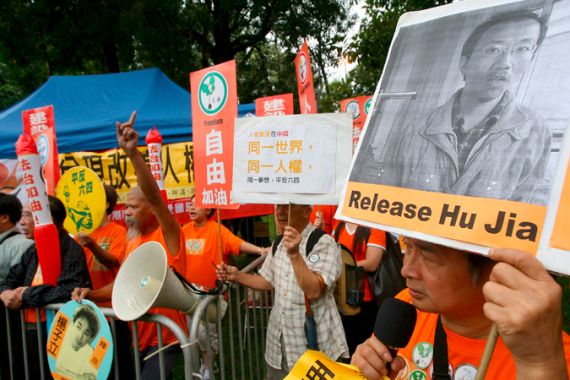China frees dissident Hu Jia
Hu was imprisoned for criticising human rights conditions in China ahead of the 2008 Beijing Olympic Games.

One of China’s most prominent dissidents, Hu Jia, has been released after serving more than three years in jail on subversion charges.
“He is back home with his parents and me,” his wife, Zeng Jingyan, told Reuters in a telephone interview.
Hu Jia was arrested in December 2007 after a long period of confinement at his home. He was sentenced in April 2008 for “incitement to subvert state power.”
Hu had written a series of articles ahead of the 2008 Beijing Olympic Games criticising the Chinese government on the state of human rights in China.
His long-scheduled release in the early hours of Sunday followed the freeing of prominent artist and activist Ai Weiwei. The releases came while Chinese Premier Wen Jiabao was visiting Europe on trips to Hungary, Britain and Germany.
But activists worry that despite their release, the dissidents will not be free in their movement or expression.
“Hu Jia should never have been imprisoned in the first place,” Sophie Richardson, Asia advocacy director at Human Rights Watch, said in a statement ahead of his release.
She called on the Chinese government not to put Hu “under house arrest or other extra-judicial deprivations of liberty.
“If that injustice is compounded by another form of detention, it will show just how shallow the Chinese government’s ‘rule of law’ commitments are.”
Interviews ‘may cause problems’
Hu’s wife said in her interview with Reuters that she did know if her husband would be permitted to speak to the media.
“At the moment, I want everything to be peaceful. I’m worried that doing interviews at this stage might cause problems. Please understand.”
|
|
In a posting online last week, Zeng said that upon his release, Hu, who suffers from a liver ailment, would be deprived of his political rights for one year.
“For this one year, the focus should be on treating his cirrhosis, caring for parents and child, to avoid being arrested again,” she wrote.
Access to the couple’s apartment building in east Beijing was blocked on Sunday, with police and other security personnel preventing journalists from approaching.
Ai Weiwei, after his release, seemed uncomfortable speaking to the media and turned down questions.
Al Jazeera’s Andrew Thomas reported from Beijing that Ai “said that he couldn’t tell us anything at all except that he can’t tell us anything”.
Catherine Barber, deputy director of the UK-based Amnesty International’s Asia Pacific programme, told Al Jazeera it “certainly looks like Ai Weiwei is under continuing restrictions” of some kind.
Ai Weiwei and Jia Hu’s release came after months of high-profile campaigning by human rights activists.
Amnesty International called for further pressure on the Chinese government regarding those who still remain in detention.
“Ai Weiwei is one of 130 people detained since February and many of them are still anguishing in secret detention,” Barber told Al Jazeera.
Sweep of arrests
In recent months, hundreds of lawyers, activists and other intellectuals have been questioned, detained, confined to their homes or simply disappeared in the wake of online appeals calling for peaceful protests across the country similar to those in the Arab world.
Though no protests took place, the calls prompted the Chinese government to launch the clampdown.
Hu got his start as an activist in efforts to highlight discrimination against Chinese HIV/AIDS sufferers and environmental degradation but later spoke out on behalf of a wide range of victims of government abuses.
As a result, he and Zeng, also an activist, have suffered repeated detentions or lengthy periods of house arrest that they have criticised as unlawful.
In late 2008, Hu won the European Parliament’s top human rights award, the $72,000 Sakharov Prize. Hu was honoured in Strasbourg, France, where because he was in prison, his name was placed in front of an empty
seat.
China’s government condemned the award, calling Hu a criminal.